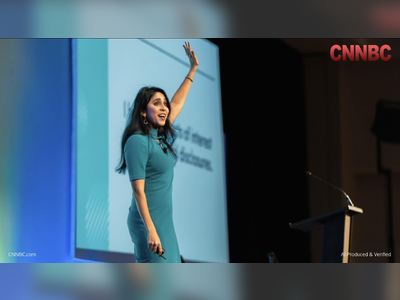AI Boom and Corporate Restructuring Leave Computer Science Graduates Struggling for Jobs
Job postings for software developers fall 71% since 2022 as graduates face rescinded offers, mass layoffs, and growing competition from artificial intelligence tools
For decades, computer science degrees were considered a reliable gateway into secure, high-paying careers.
Today, that promise has weakened as graduates navigate an industry transformed by artificial intelligence, corporate restructuring, and widespread layoffs.
Abraham Rubio, who studied computer science and game programming at Bloomfield College of Montclair State University, has applied to twenty positions since his May graduation without success.
Julio Rodriguez, a graduate of Elms College in Massachusetts, said he submitted more than one hundred and fifty applications before securing a role as a data engineer.
Other graduates, such as Danny Stalmakov in Germany, continue to face months of rejection despite holding advanced degrees.
The statistics highlight the scale of the challenge.
Employment for new graduates in computer science and mathematics has fallen by eight percent since 2022.
Software development job postings declined by seventy-one percent between February 2022 and August 2025.
The New York Federal Reserve now records unemployment rates of 6.1% for computer science graduates and 7.5% for computer engineering graduates — both higher than for many liberal arts fields.
At the same time, some of the world’s largest technology companies are achieving record valuations while simultaneously reducing staff.
Microsoft reached a four trillion dollar market capitalization last month shortly after announcing its third round of layoffs in recent months, cutting nine thousand jobs.
Chief executive Satya Nadella confirmed that as much as thirty percent of Microsoft’s code is now generated by AI.
Graduates are also confronting rescinded offers.
Nick Vinokour, a computer science graduate from the University of Michigan, was due to begin work at data-labeling company Scale AI in August.
His role was cancelled following a restructuring after Meta invested more than fourteen billion dollars into the firm earlier this year.
Many graduates say the shift is being accelerated by AI tools such as Microsoft’s Copilot and Anysphere’s Cursor, which automate entry-level coding tasks.
Some, like Stalmakov, report that AI now handles up to eighty percent of their work.
While increasing productivity, this reduces the need for large teams.
"Companies that used to need five developers might only need three now," he said.
Educators are adapting curricula to prepare students for the new market.
The University of Washington’s Paul G.
Allen School of Computer Science and Engineering is introducing an “AI-assisted software development” course this autumn.
Coding bootcamps such as General Assembly are also shifting focus, with new programmes designed to train both entry-level workers and senior executives in AI applications.
Despite uncertainty, demand for advanced computer science skills persists.
More than half of Washington’s 2024–25 graduates have already secured jobs at leading firms, including Amazon, Meta, Microsoft, and Google.
Industry leaders maintain that creativity, critical thinking, and system design will remain essential, even as AI takes over routine programming.
As one senior engineer observed: “AI won’t replace you as an engineer.
An engineer with AI will replace you as an engineer.”
Today, that promise has weakened as graduates navigate an industry transformed by artificial intelligence, corporate restructuring, and widespread layoffs.
Abraham Rubio, who studied computer science and game programming at Bloomfield College of Montclair State University, has applied to twenty positions since his May graduation without success.
Julio Rodriguez, a graduate of Elms College in Massachusetts, said he submitted more than one hundred and fifty applications before securing a role as a data engineer.
Other graduates, such as Danny Stalmakov in Germany, continue to face months of rejection despite holding advanced degrees.
The statistics highlight the scale of the challenge.
Employment for new graduates in computer science and mathematics has fallen by eight percent since 2022.
Software development job postings declined by seventy-one percent between February 2022 and August 2025.
The New York Federal Reserve now records unemployment rates of 6.1% for computer science graduates and 7.5% for computer engineering graduates — both higher than for many liberal arts fields.
At the same time, some of the world’s largest technology companies are achieving record valuations while simultaneously reducing staff.
Microsoft reached a four trillion dollar market capitalization last month shortly after announcing its third round of layoffs in recent months, cutting nine thousand jobs.
Chief executive Satya Nadella confirmed that as much as thirty percent of Microsoft’s code is now generated by AI.
Graduates are also confronting rescinded offers.
Nick Vinokour, a computer science graduate from the University of Michigan, was due to begin work at data-labeling company Scale AI in August.
His role was cancelled following a restructuring after Meta invested more than fourteen billion dollars into the firm earlier this year.
Many graduates say the shift is being accelerated by AI tools such as Microsoft’s Copilot and Anysphere’s Cursor, which automate entry-level coding tasks.
Some, like Stalmakov, report that AI now handles up to eighty percent of their work.
While increasing productivity, this reduces the need for large teams.
"Companies that used to need five developers might only need three now," he said.
Educators are adapting curricula to prepare students for the new market.
The University of Washington’s Paul G.
Allen School of Computer Science and Engineering is introducing an “AI-assisted software development” course this autumn.
Coding bootcamps such as General Assembly are also shifting focus, with new programmes designed to train both entry-level workers and senior executives in AI applications.
Despite uncertainty, demand for advanced computer science skills persists.
More than half of Washington’s 2024–25 graduates have already secured jobs at leading firms, including Amazon, Meta, Microsoft, and Google.
Industry leaders maintain that creativity, critical thinking, and system design will remain essential, even as AI takes over routine programming.
As one senior engineer observed: “AI won’t replace you as an engineer.
An engineer with AI will replace you as an engineer.”












